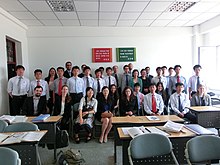Pyongyang University of Science and Technology
평양과학기술대학 | |
| Established | September 2010 |
|---|---|
| President | Dr James Chin-Kyung Kim[1] |
| Students | 500 |
| Location | , |
| Website | pust |
| Pyongyang University of Science and Technology | |
| Chosŏn'gŭl | 평양과학기술대학 |
|---|---|
| Hancha | 平壤科學技術大學 |
| Revised Romanization | Pyeongyang Gwahak Gisul Daehak |
| McCune–Reischauer | P'yŏngyang Kwahak Kisul Taehak |

Pyongyang University of Science and Technology (PUST) is North Korea's first privately funded university. It is founded, operated, and partly funded by associations and people outside the country. PUST was jointly planned and constructed by forces from both North and South Korea, along with contributions from groups and individuals[citation needed] from other nations, in particular China and the United States. The initiative is largely funded by Evangelical Christian movements. Originally scheduled for launch in 2003, the project was delayed for several years and began operations in October 2010.
History
The university is in the countryside outside of Pyongyang in a separate but close administrative region with permission required for access to Pyongyang. After introductory negotiations, the PUST project was started in 2001, on the initiative of Professor Kim Chin Kyung,[2][3][4] endorsed in a personal meeting with former North Korean leader Kim Jong-Il. Professor Kim's earlier accomplishments include being founding president of Yanbian University of Science and Technology (YUST) in northeastern China, but inside the Yanbian Korean Autonomous Prefecture, founded in 1992. The PUST will cooperate with YUST and draw on their experiences.
With exception of foreign language courses, all teaching is conducted in English. Almost all faculty work as volunteers and come from a Christian background,[5] with the president saying:
- "While the skills to be taught are technical in nature, the spirit underlying this historic venture is unabashedly Christian...."[6]
The PUST construction plans were politically troubled and slowed down in 2005 and 2006, in connection with the 2006 North Korean nuclear test, but later on resumed and have led to their conclusion. PUST classes began in the fall of October 2010.[7] It had its official opening in September 2010 and planned to enroll up to 200 higher-level students per year, from both parts of Korea. Plans include the hiring of up to 250 faculty members from universities and research institutions in South Korea, China, the United States, and other countries. As a joint venture university, the PUST is seen as a contribution to the Korean reunification process.
Kim Hak Song, who managed a farm run by the agriculture department of the university, was detained on charges of committing “hostile criminal acts” against the country on 6 May 2017. Kim Sang-duk, who also worked for the university, had been arrested on similar charges on April 22.[8] They both were released on May 8, 2018, into U.S. Secretary of State Mike Pompeo's custody after overtures were made for a meeting to be held between President Donald Trump and Supreme Leader Kim Jong-un in June 2018.[9]
Due to a ban on Americans traveling to North Korea issued by the U.S. State Department in mid-July in 2017, the university had to start the fall semester without its dozens of American staffers in September, roughly 60 out of 130 foreigners in the university, including faculty members, staffers and family members, as none of them received special permission to stay.[10]
Subjects
The goal of PUST is to contribute to North Korean economic development by producing professionals and leaders in technical disciplines, who are fluent in English and another foreign language (such as Chinese or German), and who are accustomed to working in an international setting. Bachelor of Science and doctorate degrees will be awarded in Electrical and Computer Engineering (ECE), Agriculture and Life Sciences (ALS), and International Finance and Management (IFM). The university has plans to open schools in Public Healthcare and Construction Engineering as early as 2013.[11][needs update]
Graduate students and professors have internet access, but it is filtered and monitored.[12]
See also
References
- ^ Corwin, Chris Rogers and Marshall (3 February 2014). "Inside North Korea's Western-funded university". BBC News. Retrieved 1 November 2016.
- ^ "South Korean, Once Held as Spy, Plans a University in Pyongyang" New York Times July 31, 2001.
- ^ Bill Powell, "The capitalist who loves North Korea", Money CNN, September 15, 2009
- ^ Bill Powell, The capitalist who (still) loves North Korea, Money CNN, March 15, 2012
- ^ Reuters (2017-01-30). "Private North Korean University Seeks Texas A&M Academic Help". Newsweek. Retrieved 2017-05-07.
{{cite journal}}:|author=has generic name (help) - ^ "President's Welcome" Archived 2013-05-09 at the Wayback Machine, pust.kr
- ^ Stone, Richard. "Crunch Time for North Korea’s Revolutionary New University", Science Magazine, December 23, 2011
- ^ "Pyongyang University of Science and Technology: 2 U.S. Employees Detained". NBC News. 2017-05-08.
- ^ Who are the 3 American Detainees Freed by North Korea?, New York Times, Russell Goldman, May 9, 2018. Retrieved June 18, 2018.
- ^ "Pyongyang university to start classes without American staff due to travel ban". Japan Times. 2017-09-02.
- ^ McDonald, Mark. "An Unlikely Pairing Bears Fruit in North Korea". NY Times, October 26, 2010
- ^ Will Scott (29 December 2014). "Computer Science in the DPRK [31c3]". YouTube. Chaos Computer Club. Retrieved 23 February 2015.
External links
This article's use of external links may not follow Wikipedia's policies or guidelines. (January 2012) |

